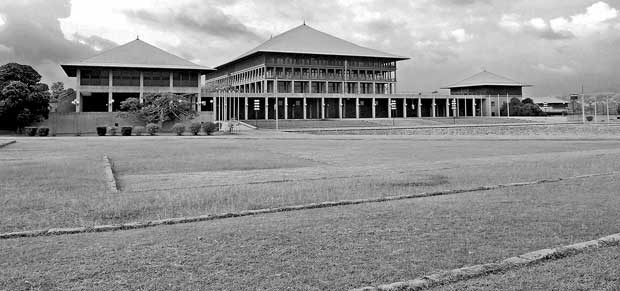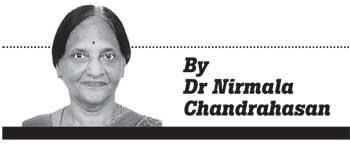Reply To:
Name - Reply Comment
Last Updated : 2024-04-27 00:40:00

A Constitution embodies a nation’s fundamental choice about government. In Sri Lanka which is one of the oldest democracies in South Asia the peoples’ choice is for democratic government. This is why one of the objectives of a new constitution is to do away with the executive presidency which had facilitated a shift towards a more authoritarian regime. However although democracy ensues the rule of the people it must be kept in mind that in a multi ethnic pluralist state it can ensure the rule of an ethnic majority. The main stream political parties reflect the ethnic composition of the country, for example in Sri Lanka the UNP and the SLFP.
These parties although not overtly Sinhala parties nevertheless reflect the interests and aspirations of the majority ethnic group. The minority ethnic / religious communities are represented by separate political parties, which reflect their interests. Only the main stream political parties can capture power at the centre because they represent the majority of people. 
Because of the composition of the population the country is in effect ruled by the majority community or ethnic group, which is a permanent majority, although for the functioning of true democracy the majority should be one which is changeable and not fixed.
This is the rationale for applying a Federal system in multi ethnic states. For example in Canada although the majority is English speaking, the French speakers in Quebec province have both provincial autonomy and also some measure of power sharing at the centre. Today the Prime minister of Canada is from the French speaking community. However even without a federal constitution it is possible to have constitutional arrangements which help to give the minority groups a greater degree of participation in the government of the Country.
Countries devising new constitutions should seek the broadest perspective in the task they are engaged in and look at the experiences of other countries, while adapting them to the circumstances in their own countries. The fact that the minority is perpetually relegated to a subordinate or secondary position and cannot exercise any power at the centre can breed a sense of disenchantment with the state which comes to be regarded as a majoritarian state, and one which does not represent them. Hence in order to have true democracy and integrate the different ethnic communities into the body politic it is necessary to have power sharing both at the periphery i.e. Provinces, as well as at the Centre. In other countries with multi- ethnic / plural populations such arrangements have been made in the Constitution.
A brief review of some of the Constitutional arrangements devised in 3rd World Countries are as follows.
1. A second chamber like the Raja Sabha in India or the Senate, which we had in Sri Lanka under the Soulbury Constitution. This arrangement could ensure provincial / minority representation in the Legislative decision making process.
2. Another method is a rotating Presidency between different communities, and a qualified majority for certain categories of legislation which have a bearing on the minority, as in the Constitution of Cyprus.
3. The South African Constitution requires the Judiciary to reflect the racial and gender composition in the appointment of judicial officers. Similarly the Canadian Constitution provides that there has to be a minimum of French speaking judges.
4. In some constitutions representation in the executive is ensured by appointing the Vice President from the minority community.
5. To remedy the in-balance in employment in Government administrative service, provision by law for equal opportunities in employment, or quotas in central ministries.
6. The Constitution of Macedonia for example provides for a certain proportion of the minority Albanians in the Armed Forces of the Country.
7 The Fundamental Rights Chapter could be expanded to include a Bill of Rights which stresses the equality in respect of language, culture and religion as in the South African Constitution. The Bill of rights could also include group rights such as the right of minorities to adequate recruitment to the Public Services and the right of disadvantaged communities, such as the Upcountry Tamils (Malayaha Tamils) to affirmative action.
The Steering Committee of the Constitutional Assembly has released the report of the Sub–Committee on Centre-Periphery relations. An interesting aspect of the report is that the principle of subsidiarity is sought to be applied so that Local government units and the Grama Rajya are also empowered, and not only the Provincial Councils. This is a welcome recommendation as it will enable even minority enclaves within majority areas to be able to have some say in managing their own affairs. This is especially necessary in the case of the Upcountry (Malayaha) Tamils.
This category of persons in the Estate sector have been unable to participate in the decision-making process in respect of their own affairs. I note that there is no reference to power sharing at the Centre in this Report or in any of the other Sub Committee Reports. However, I understand this subject is being handled by the Steering Committee and hopefully they will make the constitutional arrangements suggested.
I might mention that the report of the Public Representations Committee on Constitutional Reform (PRC) does touch on this subject. It must be pointed out that this Committee which was appointed by the Prime minister to obtain the views of the people of the Country did in fact visit all 25 districts of the Country, and had sittings from north to south where they received the representations of ordinary people who were able to give their views in both Sinhala and Tamil as well as English. In Chapter 8 of the report the committee deals with both power sharing between Centre and periphery and also power sharing at the Centre itself.
With regard to power sharing at the Centre they set out the suggestions made by the people, which were as follows. Firstly, establishment of a second chamber, which will have significant Provincial representation. Secondly election of a Vice President by Parliament from a community to which the president does not belong. Thirdly, the composition of the Cabinet to reflect the strength of the different communities. The PRC, ascertained the views of the people of the Country, and the report of this committee sets out the recommendations of the people.
It is submitted that this shows that the issue of power sharing at the centre, has been a matter which the people in all parts of the country have sought out not only as part of a solution to the national question but more so as being required to ensure more equal representation which is essential for example in the distribution of resources.
The greater representation of the Provinces in such a chamber will help towards a more equitable distribution of resources not only to the North but also to districts in the South as in Uva, Moneragala and Hambantota, thus far lagging behind in development. Hence it behoves the Steering Committee and the Constitutional Assembly to consider these proposals, and to act on them.
The constitution of a second chamber is not something new to Sri Lanka as it will be recalled that the first Parliament of Ceylon consisted of two chambers, the Senate and the House of Representatives. One argument brought against power sharing mechanisms is that it will be expensive adding further to the burden on the people.
However the advantages in giving people in all parts of the country a greater participation in governance and its positive effects on reconciliation, the resolution of the national question and in building a shared Sri Lankan identity not only for the minorities that have agitated for their rights (the Tamils, Muslims and Malayaha Tamils) but also for the disadvantaged poor in all parts of the country, outweighs the consideration of added expenditure to the exchequer. Democracy is after all an expensive commodity.

Add comment
Comments will be edited (grammar, spelling and slang) and authorized at the discretion of Daily Mirror online. The website also has the right not to publish selected comments.
Reply To:
Name - Reply Comment
US authorities are currently reviewing the manifest of every cargo aboard MV
On March 26, a couple arriving from Thailand was arrested with 88 live animal
According to villagers from Naula-Moragolla out of 105 families 80 can afford
Is the situation in Sri Lanka so grim that locals harbour hope that they coul

9 hours ago
26 Apr 2024